| |
"It's not that one wants to be gory about it, but I think part of the heroism and the courage of those bomber crews needs to be told properly for us to understand their astounding sacrifice and their extraordinary skill." |
| |
|
Screenwriter of the imminent remake of The Dam Busters, Stephen Fry, reasoning why certain deaths and their depictions were omitted in the original (too little time between the actual event and the movie). |
Yes, this is a site of general and specific movie-remake aversion (that's principally Slarek's tortured m(o)use and I'll let him, claws out, glistening sharply, toy with it before its frenzied disembowelling). But the above quote is something I thoroughly support. Fry is talking about what new aspects of this remarkable war story could be brought to the re-made tale of Barnes Wallis and his bouncing bombs, aspects that the fifties' film-makers dared not illustrate in the original so soon after the actual events. There were too many people who would be needlessly hurt as deaths of loved ones were still fresh in their minds. Fry's quite right to include and illustrate the sheer terror of a night raid flying low over water and the secret nature of the technology used to make the bouncing bombs work, some of which is still classified information.
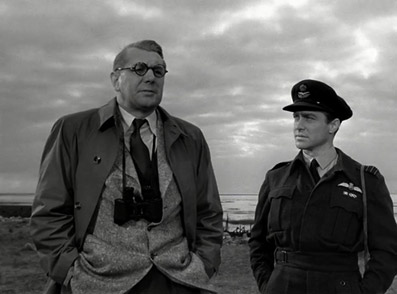
It's to Fry's credit that he's found an area, albeit of unimaginable horror, that will add bucket loads to the true story of one of the bravest attacks on enemy resources and what it took to kneecap Germany's production giants in the Ruhr Valley. There is some evidence (and Wikipedia, thy name is trustworthy?) that the mission and subsequent hammer blows were merely British morale boosting-based not practical 'war-winning' heroics – and it's a safe bet that over twelve hundred (innocent?) German civilian lives were lost due to the dams' destruction. But then again, you're at war. How easy is it to stop, think and care about collateral dam (age)?
The Dambusters is, rightly or wrongly, regarded as the spirit of war-time England writ celluloid. And the Brits are not its only fans as I'll mention a little later. Its stars are an inventor/designer engineer (a boffin by any other name) and a daring man of action who hides his fear so successfully, he is able to confidently command a mission statistically destined to wipe out over a third of his men. Never has an upper lip been stiffer. Michael Redgrave gives his Barnes Wallis a real spirit of dogged but unsupported ambition and yet hope eventually realised. Richard Todd is the poster boy of a certain sort of hero. There is nothing that exemplifies Englishness more than Todd's portrayal of Wing Commander Guy Gibson. Every nation has its cultural stereotypes and apart from some of the broader strokes, I can no more vouch for the veracity of foreign stereotypes as I can for my own. I'm with Bill Hicks on patriotism (it's just the place where your parents screwed – no further emotional connection required) but why is it that I get a tiny but definable buzz realising that I hail from the same little island as people like Guy Gibson and Barnes Wallis? Could I be proud to be British? I shudder at the thought.
I don't think it's pride. It feels more like acknowledging a pleasing coincidence. As a real life Welshman (site readership plummets as I admit this but then again, hullo Russell T. Davies), I used to get a kick out of Zulu... Men of Harlech, indeed. The real Guy Gibson was an extraordinary man, whose myriad of brave acts was duly recognised and rewarded. The Air Force even packed him off to the US to give servicemen the benefit of his vast experience just to keep him safe. It seems almost ludicrous that he died at the age of 26 after having flown one hundred and seventy four missions and in a plane crash due to a faulty fuel tank component. He ran out of fuel. What kind of a human being does what Gibson did in World War II?
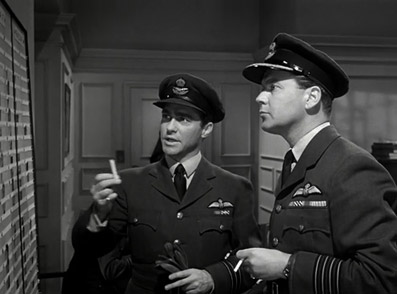
If you can, imagine this. Who, eyes wide open, would walk into a metaphorical lion's den because they knew (they just knew) it was the right thing to do – defending their take on freedom, democracy and fighting against what might have seemed like imminent totalitarian oppression. How many people do you know now who would make that lonely, terrified walk? I ask you in all seriousness. And I'm talking about now, in 2010, with our cosseted societies, enshrined 'human rights' and instant and overwhelming communicative abilities that somehow make us more distant from each other than closer. There is a 60-40 chance of you returning from this particular mission. If you have a small chance of kicking the enemy where it hurts, the enemy is going to hurt you back. So logically, there is a 40-60 chance that you will die in a metal-slashing skin, bone-breaking impact death of unspeakable terror. Bravery is too small a word.
These men (and historically they were all men which is not to demean any other gender) risked giving up their lives while deluding themselves and all those around them (in the bravest way possible) that the mission was a doddle. This, in essence, is the very hallowed concentrate of 'the right stuff'. You know the great and grave risks. You do it anyway. You do your duty, your moral imperative, even though that duty is hardwired into you at an early age like religious belief. It still can be admired and applauded like no other human trait. Courage is truly one of out best qualities. We are fast reaching an age when the two world wars will be memories with no human links to them, just books and movies that hint at the choices made and the sacrifices given during two periods of sustained bloody violence. I applauded World War II veterans a few years back on a distant Remembrance Sunday and would do so again at the drop of a poppy.
What the movie says quietly and modestly is perhaps this film's greatest strength. It says that courage and integrity matured gently with reason and insight can change the course of a world conflict. I'm less interested in the fact or fiction that the event was important or trivial in real terms. I'm much more interested in the mindset of a human being who can climb aboard a giant metallic cigar and hope/expect to land safely after the working (and bombing) day is done. What The Dambusters does simply and effectively, is showcase England at one of its finest hours. Directed robustly by Michael Anderson, the film nips along at a fair clip.
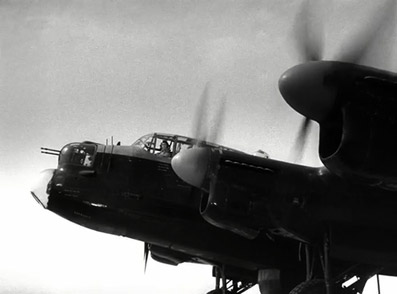
Wallis's trust in scientific principles is engaging and by the time all the training's done and ingenious solutions found to baffling problems we are left with the reality of watching one hundred and thirty three men climb into modified X-Wings and take off in an attempt to destroy the Death Star. Luke says... wait. See what I did there? Yes, George Lucas could be said to be a fan. Again we wander around the museum of mirrors and watch the word 'homage' reflect the words 'rip off'. Lucas wasn't only inspired by 633 Squadron and The Dambusters; his mise-en-scene, some dialogue and lighting effects are almost identical. OK, let's cut the man some slack. In reality, Guy Gibson was leading an aerial attack on a huge structure and he and his fellow pilots had to be absolutely accurate with his payload flying low over a pre-set path to bring this structure down. All around him are other bombers trying to do the same thing. In this scenario, you can't help but be inspired by the real thing. Yes, Star Wars fans, this stuff really happened...
The film's Englishness is quite movingly celebrated by a small moment right smack dab in the middle of the running time. Wallis has had full size mock up bomb failure after failure. He and Gibson watch as the final test unfolds. It's do or die. The bomb does exactly what it was designed to do and in a moment of sweet relief and celebration, Wallis and Gibson turn to each other and don't hug but grasp each other's upper arms while shouting and jumping for joy. In the US, manly hugs all round. We do things differently in England. It's such a nice moment made even sweeter by the effortless performances by the two leads. Speaking of the acting, there are very young but still very famous faces soon to make impacts on popular culture dotted throughout the cast. There're both actors who played No. 6 in the original Prisoner TV Series (Patrick McGoohan as a guard delivering his entire scene to Gibson's dog – more of the dog in a moment. Nigel Stock also played No. 6 in the series silliest episode). There's also a Village No. 2 from the first episode as one of the squadron (George Baker). Dad's Army's Private Frazier is there as is a very young actor soon to menace James Bond just under a decade later in From Russia With Love, Robert Shaw.
Just a last thing to mention about the film's special effects. Considering that effects seem to be all young people care about today (says me en route to Prince Of Persia – hey, it's raining and I have a thirteen year old son) let me be quite frank and say that a huge percentage of the flying and the bomb dropping was done for real by real pilots in real planes. Yes, there is obvious back projection (don't pay it any attention) but there used to be a real problem with one aspect of real life and duplicating it with any verisimilitude. Watch Superman pushing a huge rock to stem the effects of a broken dam. Try as you might, you cannot miniaturise water. Of course, there were no bespoke computer generated swells available so you build your dam model as best you can and implement the explosions with some optical work overlaying (curiously) shots of waterfalls or mid shots of rapids. The physics is a little up the spout and as these explosions are the climax of the action, that's a tough time to drop the ball. But no matter. The drama is terrific, the direction and performances solid and the fact that it's true lends the rather smashing Dambusters a real pedigree. I could only ever use the word 'smashing' to describe this film with no irony or pun intended. It's the movie that Wallace (as in Gromit and not Barnes) would choose as his favourite film. It's a great movie and I have very fond memories of seeing it with my father as a child. I only hope that Slarek can report favourably on the condition of the print... Did I miss anything?
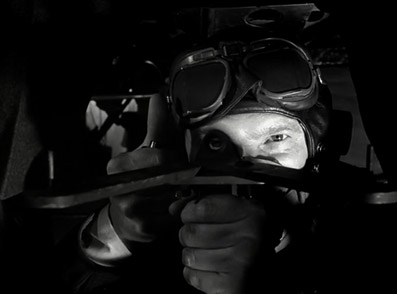
Ah yes, the dog...
Postscript: The 'N' Word
Oh, and as an afterthought which could have been a big deal and I'm hoping I'm not making it one now but in reality as portrayed in the movie, Guy Gibson has a black Labrador called 'Nigger' and 'Nigger' is also the code word to indicate one of the dams has been breached. I have spent hours researching its etymology but can only conclude that it was a perfectly reasonable name in the 40s (in England) and had none of the connotations strapped on to the word from the late 40s onwards. In that context, the word was as offensive as 'Rover'. Stephen Fry and producer Peter Jackson, it is rumoured, have settled on 'Nigsy' as a compromise. I'm warning you in advance because it's quite a shock for anyone who knows the now somewhat Tarantino-diluted power of the 'N' word.
| That Darn Dog – the 'N' word problem and additional, by Slarek |
|
There's no doubt about it, 'nigger' is an ugly, nasty and frankly inexcusable word. It's an insult designed to belittle someone not for anything they have done or believe in, but because their skin is a different colour to the idiot dishing out the insult, a colour that very same fool will spend a good part of the summer trying to tan their own skin to resemble. It's more than a put down, it's a verbal club, one born of irrational hatred that's backed by a threat of history of violence or worse.
In America, a portion of the black community have reclaimed the word, much as the gay community have with the word 'queer', a term once also used as an insult that has been turned into a badge of honour. Unlike 'queer', however, which is now deemed acceptable for use by those of any gender preference on both sides of the Atlantic ('Queer Cinema' is now the default term for gay-themed movies), the use of 'nigger' as a term of brotherhood is specific to one community and locale. It has never found favour within the black community here and its use in some quarters of black America doesn't give white Americans automatic licence to do likewise.
It's a sad fact that widespread awareness of the true connotations of such racial insults is a relatively recent development and that far too many still deem racism of one form or another as somehow acceptable. That doesn't mean every Briton was once racist by default or even that it was somehow endemic to British cinema of the post or even pre-war period. Take a look at Pen Tennyson's 1940 film The Proud Valley, whose black central character (played by the magnificent Paul Robeson) is accepted into the predominantly white mining community and is ultimately cast as a heroic figure. Maybe its just the Welsh socialists who were the progressive ones.
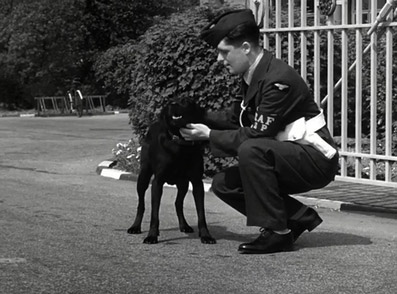
Things may have changed, but back in Guy Gibson's day it was, I am assured, quite rare to enter the RAF as an ordinary aircraftman and work your way up the ranks. The Officer Class was something you were born and educated into, and with that came attitudes that were often absorbed from the community you were by default part of. You can read whatever you like into the fact that Gibson himself was born in India during the British Raj and educated at Oxford, but the fact of the matter is that he did indeed have a dog named Nigger whose untimely fate was exactly as it plays out in the film.
It has to be said that in the 1940s the term was far more widely used than it is now, though more out of ignorance and an ingrained social racism than open hostility. One of Agatha Christie's most celebrated stories was first published in 1939 under the title Ten Little Niggers (it later became known as And Then There Were None and has been filmed both under than title and as Ten Little Indians), and you'll find the word peppered throughout British literature and culture of the pre-war period, including the work of Rudyard Kipling and P.G. Wodehouse.
The problem its use in this film presents for a present-day audience is that in portraying Gibson as likeable, level-headed and heroic – which he no doubt was – the filmmakers appear to endorse the use of a term we now rightly regard as unacceptable, when what they were actually doing was presenting events as they happened, albeit at a time when the full implications of the word were not widely appreciated. That doesn't make it's usage here comfortable viewing – I genuinely twitch every time that dog gets a mention – but I do think it's important that the film be shown as it is and that we face up to rather than shy away from the attitudes and prejudices of our colonial past, and that we openly discuss rather than attempt to shut our eyes and ears to them. And yet that has happened with this very film. Back in 1999, and again in 2001, ITV screened a version in which every use of the offending word was removed, while in some American version of the film the dog's name has been changed to 'Trigger'.
It's certainly understandable why anyone attempting a remake would balk at following in its predecessor's footsteps on this particular point, but it does provide us with a slightly ironic twist: while the remake (which my unlikely reaction to is the subject of some slightly catty speculation at the start of this review) is able to include story elements that were excluded from the original due to its production date proximity to the events in question, a different kind of sensitivity will likely see those responsible for the new version making their own small but still significant change to historical fact.
As a final concurrence with my fellow reviewer, however, I'd emphasise that it really is worth dealing with this contentious hangover from archaic attitudes to appreciate what is still one of the finest British war films ever made, a beautifully constructed and understated tale of scentific ingenuity (I'm always bowled over by the amount of screen time devoted to the development of the bomb, a fascinating scientific story of triumph against unlikely odds in itself), heroism and British reserve at its best (in a memorable post-raid sequence, two of the surviving airmen simply walk into their room and wordlessly drop on their beds for a well-earned rest). It also contains one of my all-time favourite movie dialogue exchanges: as Wallis seeks equipment to continue his experiments, an astonished official from the Ministry of Aircraft Production asks him what possible argument he could put forward to persuade those in charge to lend him a Wellington bomber for his test runs, to which Wallis humbly replies: "Well, if you told them I designed it, do you think that might help?"
Framed in its original 1.33:1 aspect ratio, the picture quality is generally very impressive, boasting a sharpness and level of detail you'll not have seen on any previous home video version, instantly noticeable in the wood grain on the catapult in the testing tank, the texture on clothing when Wallis first meets Gibson, the crispness of shots of the airman during the night raids or when Wallis listens anxiously at HQ to progress on the bomb runs...there are plenty of examples throughout. Although very occasionally a little harsh on the black levels, the contrast is generally very well balanced and there's very little trace of dust or damage, despite the odd remaining scratch. The only down side of such an upgrade is that the stock footage and sometime iffy matte effects do tend to stand out all the more, as do the landscape and dam models, but they too are so crisply reproduced that it's hard to complain. All in all, a fine job.
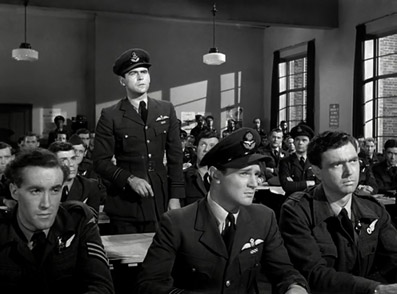
The PCM 48 mono soundtrack has an inevitably narrow dynamic range that's typical of the period, but there's no distortion or evidence of damage and both the dialogue and music sound fine.
Dambusters: 617 Squad Remembers (56:28)
A more than welcome look back at the Dam Busters raid, hosted and narrated with almost heroic enthusiasm by author Max Arthur, author of the book Dambusters, and built around interviews with surviving members of 617 Squadron, the men who carried out the famed mission. This is very much the story of the squadron and the raid – Barnes Wallis gets only a couple of passing mentions – and charts the build-up to and execution of the mission in sometimes fascinating detail, much of it testifying to the film's factual accuracy. There are a few surprises – just about everyone enjoyed the low-level flying practice, one even describing it as "exhilarating" – while some expectations you kind of hoped would be turned on their head are confirmed, such as the officers' party to celebrate the success of the raids from which ordinary airmen were excluded; "typical of the air force at the time," comments one of the men with just a whiff of cynicism. Gibson, meanwhile, is painted as a good leader who did not tolerate failure and wouldn't listen to excuses even when they were valid. The matter-of-factness and modesty of the interviewees belies the extraordinary nature of their mission and the considerable risks they took. This is a 1080p HD extra, as you'd expect from a Blu-ray only release, and the picture and sound quality are excellent throughout.
Let's keep this simple, a terrific film on a fine Blu-ray, not exactly bursting with extras but the one that is included is substantial and fascinating, and the picture quality on both that and the main feature are fine. Deal with the archaic blips and wobbly special effects and appreciate the performances and real cinematic craftsmanship. Recommended.
|